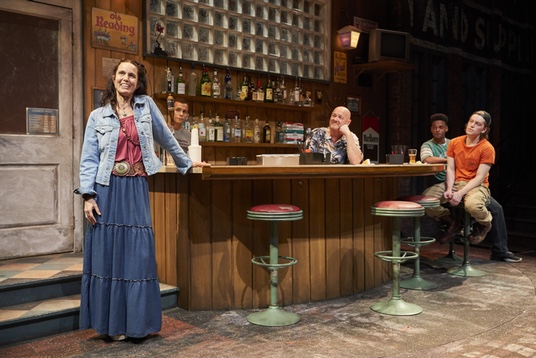
Through Sun 11/4
Lynn Nottage’s tense, sometimes depressing drama Sweat is set in Reading, Pennsylvania, but it might as well be in Cleveland. At least that’s how it felt Saturday night watching the moving Cleveland Play House production directed by Laura Kepley.
Written in 2015 and set in 2000 and 2008, the Pulitzer Prize-winning play moves forward and back in time to show how two generations dealt with drastic change thanks to cutbacks and recession. The Olstead steel plant they had given their lives to and the unions they had trusted seemed indifferent to their fate.
It’s a gripping work, one that looks at past events and humanity with an unflinching gaze. Rather like a Shakespearean history play, it provides the necessary background (why heavy industry workers did very well — until they didn’t), but it isn’t a thinly disguised lecture. There’s plenty of drama too — with intimate confessions and battle scenes that produce disastrous results.
A few minutes into the first act, Nottage’s work grabs the viewer and never lets go as it exposes the lives of those who unwillingly rode a disaster that took longer than a hurricane, but was just as destructive. The economic tsunami of closing mills and sending business elsewhere swept all before it.
We see people we like as we get to know their lives. There’s a strong emphasis on an individual’s choice when handed a fistful of poor and/or difficult alternatives. Nottage shows how some reacted relatively sanely (i.e. constructively) and some did not.
Most action takes place in the friendly neighborhood bar, a place where people socialize as they drink so-so tap beer. (The quality of the beer is a running joke. Program sponsor Great Lakes Brewing Company must have a sense of confidence in its product. Where were our samples?) Robert Mark Morgan has designed a great space for the bar, utilizing a rotating stage and making a good use of its step up (which can also be a step down as characters stumble over it).

Best friends Cynthia (a steady and practical Nehassaiu deGannes) and Tracey (a spirited Nancy Lemenager) have worked together at the plant for over 20 years and now celebrate each other’s birthdays every year at the bar. Cynthia is African-American, but neither seem to notice race until Cynthia gets promoted instead of Tracey (who is white). Lemenager and deGannes make the shift of years and feelings so real that it’s easy to relate to both.
Two other characters have basically already given up on life. Cynthia and Tracey’s work friend Jessie (a sometimes comic Chris Seibert) spends most of her time drunk and passed out with her head down on the table. Cynthia’s husband Brucie (Jimmie Woody), an addict, drops in at the bar from time to time to ask for money.
Cynthia and Tracey’s sons represent the younger generation and both (like their mothers) also work at the Olstead plant and drink at the bar. We first meet them in the play’s two short opening scenes. It’s the “present” and they are each (in separate interviews) discussing life after prison with their parole officer, Evan (a voice of reason well-represented by Robert Barry Fleming). Jason (Jack Berenholtz), adorned with Nazi tattoos, is sullen and lost. Cynthia’s son Chris (Brooks Brantly) carries a Bible and believes he has found education and salvation. Both Berenholtz and Brantly show believable changes as they learn to face their new reality.
Stan (Robert Ellis), the fair-minded bartender (and unofficial father-figure), tries to keep order when things get rough. He’s helped out by Oscar (a likeable Xavier Cano), a Latino who tries his best to escape attention, but fails. He represents the new scapegoat: immigrants.
BOTTOM LINE: A fascinating and believable look at a dark period in recent American history that makes clear that one path (perhaps the only path) to a better life for everyone starts with charity and empathy. But it’s not a sermon: I promise. Very fine production, great theater.
[Written by Laura Kennelly]
